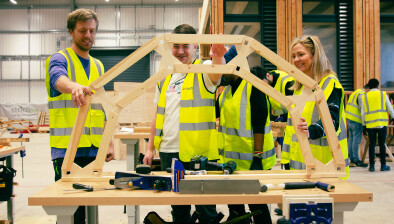Construction sector ‘still largely unaware’ of post-Brexit points-based migration system

Low levels of awareness and engagement with the Points-Based System (PBS) post-Brexit continue to exacerbate existing skills shortages within the UK construction sector, according to the latest Migration and Construction report by the Construction Industry Training Board (CITB).
Only half of the employers surveyed indicated that they were aware of the PBS. Only 7% of employers reported that they have signed up as a licensed sponsor.
But there are plans to work closely with industry to make employers more aware of the benefits and how to navigate the system.
Addressing any barriers preventing employers, particularly small and medium-sized enterprises (SMEs) accessing the scheme and benefitting from recent changes to the Shortage Occupation List would help enable employers to more easily recruit migrant workers in high-demand occupations.
This is the sixth report and the first since the end of the pandemic and the introduction of the Points-Based System in January 2021 when the UK formally left the EU.
The report’s other key findings include:
- The share of migrant workers in the construction workforce fell to 9.8% in 2021 (latest year data is available for) from 10.2% in 2020 and 10.7% in 2018.
- Even in the early stages of recovery from the pandemic, and despite modest growth in output, over half (55%) of employers indicated that they have faced recruitment difficulties over the past two years.
- Almost a quarter (23%) of firms reported that recruitment had been very difficult. These problems have been greatest for larger firms employing more than 100 people (76% of employers) and in London, South-East and East of England (62%).
- The industry needs to deliver on its commitment to grow and invest in its domestic workforce by tackling long-standing weaknesses in how it attracts, retains and develops its workers skills and capability by raising the levels, quality and relevance of training.
- However, the Government, Construction Leadership Council (CLC) and industry need to work together to raise employer understanding and awareness of the PBS and to make the system work better for construction to address some of the critical short-term skills needs that industry now faces.
The government has responded to evidence from CITB and CLC of the recruitment pressures on construction employers by widening the range of occupations covered by the Shortage of Occupation List (SOL) in the Spring Budget.
The Shortage Occupation List (SOL) points out which jobs are facing shortages and aims to make it easier to hire migrant workers in these occupations. An ongoing consultation into the SOL was launched by the Migration Advisory Committee (an independent body advising on immigration) in March.
CITB’s migration and construction research has been critical in helping industry and government understand the skills and migration challenge industry faces.
Partnership work between industry and government aims to create a dynamic migration solution post-Brexit.
To help relieve pressures on employers, the CLC, industry groups and CITB have developed an Industry Skills Plan and are working with the government to put a range of support in place.
But the CLC has called for more to be done.
James Butcher, director of policy at the National Federation of Master Builders (NFB) and chair of the CLC’s Movement of People Working Group, said: “It’s important that awareness issues and barriers to how employers use the PBS are overcome to access the Skilled Visa Route and benefits for occupations on SOL, as shown in the report.
“The recent Construction Skills Network report from CITB highlights a need to invest in and train the domestic workforce to meet skills gaps and futureproof the industry.
“But that will take time – and the pandemic has already worsened the recruitment challenges faced by employers, from SMEs to major firms.
“So, in order to respond to critical needs in the short to medium term, we need to have a dynamic migration system in place.
“This report lays that bare and identifies areas we can make meaningful improvements.
“We will work closely with our partners in government and industry to make the changes that will open up opportunities for employers and help them to become more agile in their recruitment processes so they can meet demand.”
Marcus Bennett, head of industry analysis and forecasting at CITB, said: “At CITB our focus is on supporting employers to recruit, train and retain the workers needed to meet levels of demand both now and in the future.
“We need to make construction an attractive place for a greater diversity of people to work, by improving employment practices, flexibility and the way we recruit. We will continue to encourage new entrants into the industry through training and support, including our apprenticeship schemes and grants, to bolster our domestic workforce.”
David Barnes, policy and public affairs manager at CIOB, said: “Migration is a vital factor in plugging the significant skills gap across the construction industry.
“CIOB welcomes this new report by CITB which further highlights the clear need to increase the domestic pool of construction workers.
“Research clearly shows many construction companies feel migrant workers are critical to their business, but the new points-based system is convoluted and expensive – potentially deterring companies from looking overseas when recruiting.
“CIOB has also worked closely with the Construction Leadership Council following the recent Migration Advisory Committee’s review of the Shortage Occupation List.
“Together, we identified the most difficult areas to recruit within alongside the need for far more flexibility to help achieve key governmental targets in areas such as housebuilding.
“We urge the Government to consider drastic improvements to its engagement with construction companies regarding the points-based system and to review both its cost and navigation.”














